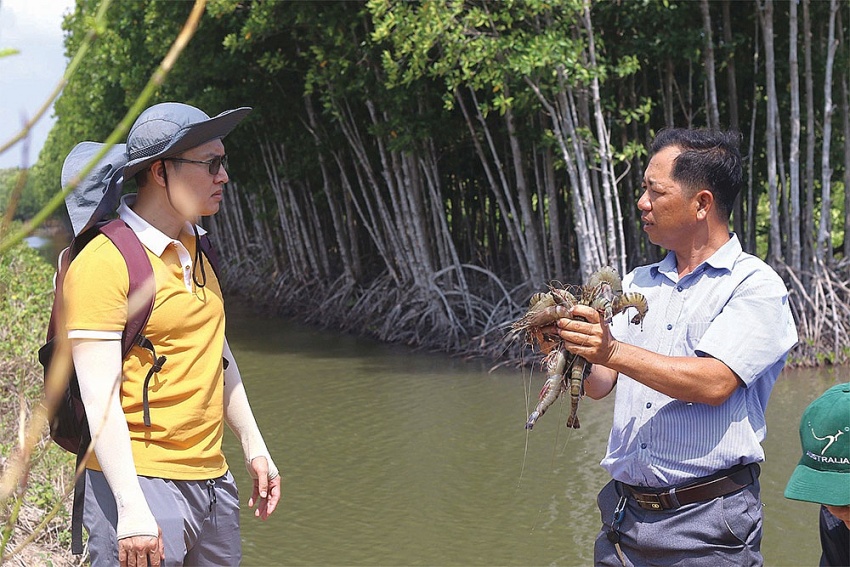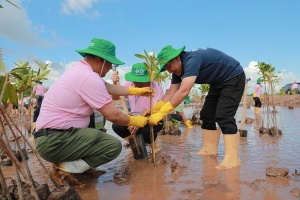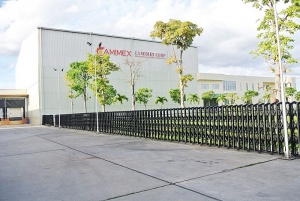Shrimp farms adapt to modern techniques
After over 30 years of manual and self-sustained shrimp breeding, Thuy Nguyen, a resident of Nam Can district in the southernmost province of Ca Mau, decided to switch to natural farming last year.
Thuy said that the most attractive benefits for such farmers were receiving support for high-quality shrimp brood-stock, training in antibiotic-free farming techniques, and having stable output.
“The most important requirement when participating in eco-friendly shrimp farming is the prohibition of chemical treatments. Each household will be supported with around 20,000 brood-stock per hectare each year and will have a partner to purchase the final products at a price higher than the market by 2-5 per cent,” Thuy said.
With six hectares of water surface area for aquaculture under mangrove forests, primarily shrimp farming, the new method has brought Thuy higher productivity and a more stable income of over $10,000 per year, including earnings from shrimp farming as well as the cultivation of crabs, clams, and fish in the same area.
Thuy also has an additional income of about $4,200 from harvesting mangrove forests every three years. Additionally, he receives additional support for forest environmental service fees per hectare annually, a mandatory fee that aquaculture facilities contribute to the protection of the forest ecosystem.
“I believe that the value of eco-friendly shrimp farming will gradually increase over time. With natural-oriented cultivation, not only does the quantity and quality of shrimp improve, but the water source and the surrounding forests in the farming area are also protected,” Thuy said.
 |
| Mangrove forests have suffered from degradation in the past, Photo: Le Toan |
In November last year, the Australian government launched the Business Partnerships Platform Climate Change Adaptation in the Mekong Delta region, with a total funding value of AU$2.5 million ($1.63 million) towards 2025. Scaling climate resilient mangrove shrimp farming in the Mekong Delta is a part of this initiative, receiving funding of AU$1.5 million ($977,000).
The project aims to help smallholder farmers practice climate resilient farming techniques that will improve the shrimp supply chain while also enhancing the mangrove landscape. Smallholder farmers will have the opportunity to become certified providers, opening them up to new markets. The project also looks to increase mangrove retention and coverage, improving socioeconomic impacts and gender inclusion, while building climate resilience.
Le Dinh Huynh, secretary general of the Vietnam Sustainable Shrimp Alliance, said that although the project had only been activated for a few months, it had already reached approximately 400 shrimp farming households, and this number was expected to grow.
“The approach of the project in the next two years is to ensure the sustainable protection of mangrove forests through the voluntary participation of the local community. When their livelihoods are secured, they will be motivated to restore and preserve the forests,” Huynh said.
The mangrove forests in Ca Mau in the 1980s and 1990s suffered severe degradation due to deforestation by local communities for shrimp farming and livelihood development. In recent years, as the mangrove forests have started to recover, the reoccurrence of saltwater intrusion has directly threatened the shrimp industry.
“Saltwater intrusion is a consequence of climate change and greatly affects aquaculture in the Mekong Delta,” Huynh said. “If the salinity levels rise too high, shrimp and other aquatic species cannot survive, and there is also an increased risk of disease outbreaks.”
The purpose of the project is to empower local people with better knowledge and techniques to enhance shrimp production. “We help the local communities improve their knowledge and techniques to achieve higher productivity in shrimp farming by providing support for input services such as quality seeds and connecting small-scale farmers to the international market through eco-certification,” Huynh said.
Trinh Trung Phi, deputy general director of Viet Uc Seafood Corporation, said that the quality of shrimp stock determines up to half of the effectiveness of the farming. Therefore, only when farmers proactively acquire high-quality stock and combine them with investments in modern farming technologies can they increase productivity and meet the increasing demands of consumers.
“We aim to create a product that is free from antibiotic use, from the source of stock to the final finished product,” Phi said. “We are actively investing in tech and developing biosecure shrimp farming models, with the hope of gradually transferring tech to the local community.”
 | Biodiversity drive at C.P. Vietnam's shrimp farm On August 10, C.P. Vietnam and Nichirei Fresh Inc., launched a tree planting project to facilitate water treatment at the C.P. shrimp farm in Hoa Binh district of the southern province of Bac Lieu. |
 | FMO proposes $15 million investment in Vietnamese shrimp producer Dutch Entrepreneurial Development Bank (FMO) is mulling a credit package of $15 million for Vietnamese shrimp producer Camimex Group JSC. |
What the stars mean:
★ Poor ★ ★ Promising ★★★ Good ★★★★ Very good ★★★★★ Exceptional
Related Contents
Latest News
More News
- State corporations poised to drive 2026 growth (February 03, 2026 | 13:58)
- Why high-tech talent will define Vietnam’s growth (February 02, 2026 | 10:47)
- FMCG resilience amid varying storms (February 02, 2026 | 10:00)
- Customs reforms strengthen business confidence, support trade growth (February 01, 2026 | 08:20)
- Vietnam and US to launch sixth trade negotiation round (January 30, 2026 | 15:19)
- Digital publishing emerges as key growth driver in Vietnam (January 30, 2026 | 10:59)
- EVN signs key contract for Tri An hydropower expansion (January 30, 2026 | 10:57)
- Vietnam to lead trade growth in ASEAN (January 29, 2026 | 15:08)
- Carlsberg Vietnam delivers Lunar New Year support in central region (January 28, 2026 | 17:19)
- TikTok penalised $35,000 in Vietnam for consumer protection violations (January 28, 2026 | 17:15)

 Tag:
Tag:




















 Mobile Version
Mobile Version